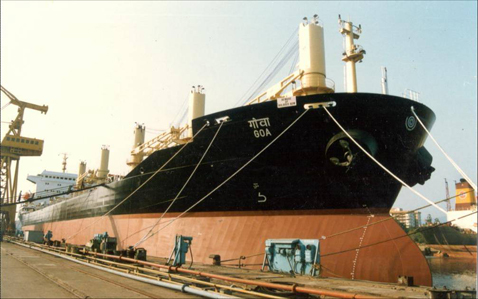
Taking into account the growing demand for steel by shipbuilders, the Ministry of Shipping has now decided that re-rolled steel obtained from ship recycling and shipbreaking yards will be certified for use in construction of inland barges, River Sea Vessels (Types 1 & 2) and port and harbour crafts. The certification will be provided by the Indian Register of Shipping, an internationally recognised independent ship classification society, after ascertaining the source and processing of the re-rolled steel.
The use of re-rolled steel is likely to bring down the construction cost of barges, RSVs, and port and harbour crafts.
The steel plates recovered from recycled ships can be used in shipbuilding after a hot rolling process. During this process, the steel re-rolling mills heat the steel plates to a temperature of 700-910° C (above the recrystallization temperature) and then roll the steel into sheet bars, plates and profiles of required dimensions. Re-rolled steel by cold rolling process is not acceptable.
The IRS has laid down conditions for usage of re-rolled steel in shipbuilding. Under these conditions, re-rolled steel can only be used in construction of inland vessels and harbor crafts that will not proceed to the sea, and RSVs Types 1 & 2 for sailing in fair weather. Such vessels, which are subjected to relatively lower levels of cyclic stresses due to waves, have lower risk of fatigue failure. The conditions stipulate that use of re-rolled steel should be avoided in highly stressed areas like continuous hatch coaming tops and structural members in mid-ship area to avoid low cycle fatigue failure as a result of variations of stress in different loading conditions. It limits the thickness of plating to a maximum of 12 mm to avoid the possibility of usage of high strength steel obtained from scrapped ships.
Steel re-rolling mills intending to produce steel for shipbuilding will be initially subjected to works approval by class for which application has to be submitted to the IRS.
Works approval will cover the rolling process including the pre-heating temperature and soaking time, verification of the mill’s quality management system (ISO 9000 or equivalent) for ensuring consistent quality of product, and testing of samples of steel produced by the re-rolling process.
Prior to re-rolling, the steel acquired from recycling yards for use as raw material need to be subjected to inspection and testing for establishing its chemical and mechanical properties, the conditions point out, adding that the general condition of the steel should also be verified to rule out undue corrosion, cracks and pitting. Based on the test results, mild steel having properties meeting the requirements of IRS class rules will be identified and accepted for re-rolling.
The re-rolled steel certified at approved mills will be given specific branding and identification mark. Such a measure is going to ensure that the re-rolled steel does not get supplied to other ships or areas not covered under the procedure laid down for certification and usage of re-rolled steel in shipbuilding.
The conditions also require that before using the re-rolled steel for fabrication at shipbuilding yards, satisfactory welding procedure qualification tests as per IRS standards should be carried out to ensure the suitability of the steel as well as the welding methods.











